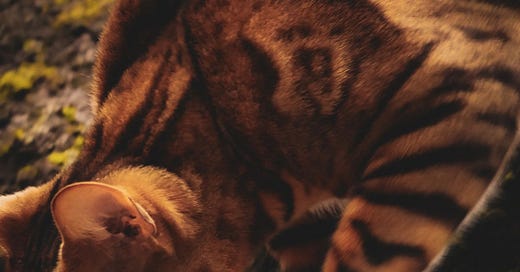There are a few articles that make the claim that cats are psychopaths, and I always find them amusing, but also rather misguided in their claims. Many times, the ideas of psychopathy are misunderstood, and also, cat behavior is misunderstood, which creates this conflation.
First, we will go through a few of the claims regarding cats being psychopathic, my rebuttal, and then an interesting point by C.S. Friedman regarding cats and psychopathy, that was the only time I thought there was something to the idea.
First and foremost, I am going to state something that tends to rile some people up, and there are some exceptions to this, of course, but I notice that when someone’s animals are neurotic or have poor behavior, it is a direct result of the person raising them.
I have seen this time and time again, and so often my Significant Other and I are asked how it is that all of our animals are so damn awesome. It is because we are both extremely chill people, and that means our animals are also extremely chill. On the other hand, I have known many people that can never seem to see the direct correlation between how they live and how their minds work to how negatively their animals behave. So, chances are, if you have emotionally unbalanced and/or destructive animals, this is something that you should consider as a reflection of your own way of living/being. Maybe not, maybe you are the exception, but often, this is the case.
For those of you still here and didn’t rage-quit over my observations, let’s get into this.
Lovely starting place with that title there…
Most people know that cats can be unpredictable. Now, scientists have developed a test which proves that cats have psychopathic characteristics.
Cats have been loved, valued and even worshipped by people for thousands of years. Their behaviour can seem unpredictable – sometimes friendly, sometimes aloof.
Unpredictability is not an indication of psychopathy. Also, no test can “prove” that cats are psychopaths. For this to be the case, you would first have to be able to prove that psychopathy can be observed in cats, and by that I mean that you have to be able to show that cats not only have the brain formation that psychopaths do, but also that their chemistry processes like psychopaths do as well. You can’t do that, because animals and humans do not share the same neurological makeup, which means that you cannot look for something that specifically occurs in humans due to their brains’ form and function, and then believe that you are observing the same thing in animals that do not have the same form and function in their neurological setup.
That’s not how that works.
Moving on.
Now British scientists have concluded that domesticated cats also have a rather darker side, matching the markers that would indicate they are psychopathic.
Scientists from two universities in Liverpool have developed what they call the CAT-Tri+ test…
Oh, this should be funny.
…the first of its kind. It consists of a questionnaire which has been made freely available online. The 46 questions are based on a scientific study in which scientists analysed a total of 2042 domestic cats using owners’ accounts of behaviour.
Wait, wait, wait, wait…
You’re telling me that you made a questionnaire that is supposed to identify psychopathy in cats? Are you going to ask the kitties questions? If so, please record that, and put it on the internet for all of us to see, because that would be some awesome entertainment. All right, this “test” proves nothing then, because it is one of two things.
They are asking the kitties questions, and we all know how seriously we should be taking that.
They asked the owners to answer the questions, and that is problematic for two reasons. The first being that no one can read their cat’s minds, and the second being that they are interpreting cat behavior through human eyes. Sorry, no. I see how poorly humans interpret other humans, so you certainly cannot do this with cats.
I am including the link to this test, and so far it’s silly:
The Cat Triarchic + questionnaire (CAT-Tri+)
The first question:
My cat explores dangerous places (e.g. gardens of rival cats, very high places)
Dangerous to whom, exactly? They aren’t dangerous to cats, they are dangerous to humans. For anyone in need of a quick education in the crazy things that cats do and survive often, here you go:
That’s just the first question, and already it is clear that they are going to try to see cat behavior through human experience, and that is a total waste of time.
Question three asks: My cat seems unaware of danger (e.g. runs into the street, makes risky jumps)
Umm… so are dogs. Like… have you seen how many dogs just run in front of cars? Let’s talk about deer. Pretty skittish animals, and yet they seem to be totally unaware of the danger of cars, and because they are so large, and cause damage when they yeet themselves in front of them, that these are a thing:
Would they now like to evaluate deer for psychopathy? What about squirrels?
I am scrolling through some of the questions, and a large number of them are asking about cats and their preference for heights. I don’t know if you guys know who Jackson Galaxy is, but he’s a cat guy. That’s his whole thing, helping people with their cats. Cat behavior is like his entire life, and he describes cats as either bush dwellers, or tree dwellers. In other words, looking for high places is hardwired into many cats. It isn’t something that you can look at as a fearless trait.
That would be like saying, because seals dive under the ice in the arctic to fish, they are fearless when it comes to dark water. But… that is how they have existed for generations. That’s what they instinctively do. I don’t think that there are seal support groups where they sit around and talk about how afraid they are of the dark water, but they have to go into it anyway to live. I don’t think this is a thing:
My cat chases other cats out of the residence/garden
So… territorial? Yeah, again, this is normal for animals to be. Even gerbils are territorial, and yet, I don’t see this article.
All Gerbils Are Psychopaths
That would be a funny article. I admit, I would read that.
My cat disobeys house rules (e.g. walks on the worktop/table, climbs the curtains, runs away when called)
Did you… did you get the cat to sign a contract regarding the house rules? I mean, without a contract, I don’t know how you are going to prove that the cat ever agreed to the house rules to begin with.
How is this an article, let alone a “test” that apparently “proves” psychopathy is cats?
Good lord, moving on again.
According to the article:
The questions are framed around the three main characteristics of human psychopaths: boldness, spitefulness and recklessness, plus whether the cat is friendly to other pets and humans.
Yes, HUMAN characteristics. It would be far more accurate to ask if psychopaths are cats, not the other way around, and if that sounds stupid, that’s because it is. This whole thing is ridiculous.
Also, spitefulness has nothing to do with psychopathy. I don’t know where they got the idea that it did, but they are wrong. Also, also recklessness is not a trait of psychopathy. Impulsiveness and fearlessness is, and that can lead to recklessness, but they are not the same, and it isn’t related. Also, also, also, recklessness isn’t how to describe cat behavior. Perhaps it would be if you were thinking that cats reason the way humans do, but they clearly don’t, which is why this so-called test exists. They are trying to conceptualize cat behavior as it relates to human behavior.
This is reckless:
This is normal:
We… and follow me here… are not the same species. I know, I know, that’s shocking. I mean, how else would we explain human beings’ adorable fuzzy ears and long lanky tail? What do you mean we don’t have them…?
Yeah, cats are not humans, and I get not being able to clearly understand their motivations in the world, but that doesn’t mean that we are magically the same, nor even similar. Also, cats have built in tools to make it possible to do what humans consider reckless things. They have incredibly flexible spines, claws for grip, excellent balance, etc. Humans have none of those things, so the comparison is moot.
Based on the answers from the 2042 cat owners, the scientists found that it likely all cats have psychopathic tendencies to varying degrees. Cats may be among the world’s most popular pets, with Statista estimating some 370m house cats worldwide. Yet they remain unpredictable, and are all predators. Australia’s 3.7m domestic cats wreak havoc on wildlife, killing an estimated 230m native Australian birds, reptiles and mammals every year. A pet cat that can roam and hunt may kill 186 mammals, reptiles and birds each year.
Let me get this right… cats are psychopaths because they are hunters? Seriously? Are orcas psychopaths?
Because, they really like playing with their food. They will hurl seals into the air just to run them down to do it again, all before eating them. Oh, and it’s not just seals:
Where is the article about the psychopathic orcas? Don’t get me started on sharks.
Also, yes, cats are predators. Did the authors of this study and article think that just because we have them in our homes, that suddenly overwrites eons of hardwired instinct? That is not going to happen. They are naturally predators. They always will be. I know this is an underhanded way of stating that psychopaths are predators, but I will just be ignoring that nonsense from this article. They can’t figure out that cats behaving normally doesn’t make them psychopaths, so I am not exactly giving them intellectual credit on anything else.
If the thought of sharing your home with a carnivorous psychopath…
They’re not psychopaths.
…seems worrying, the scientists tell us to take it easy: such characteristics are a natural part of cats’ evolutionary history…
Sooo, they knew that, but decided to make up this “study” to reimagine cat behavior for clickbait? That kind of seems to be the case.
and the test was developed to improve the relationship between humans and cats…
How though? Nothing about this would improve anything. The idea is that psychopaths are somehow relatable to most people (they are not) and that telling people their cat is a psychopath is going to make them love their cat more?
Have these people taken three seconds to google search what most people think about psychopaths? Because that seems like it would be a simple thing to do to debunk this whole narrative and keep them from wasting their money on this silly thing.
…so that pet owners, vets and others can understand individual cats as fully as possible.
Again, how though? Neurotypicals don’t understand psychopaths, so how would comparing them to us make them somehow more understandable? That is like saying you can understand quantum mechanics through interpretive dance. These are not relatable things.
When at home, our psychopathic cats rarely do worse things than break vases or exhibit strange behaviour – like sudden loud cries or movement, or sitting on objects you are clearly about to use.
They’re not psychopathic, and it sounds like the cat being described simply wants attention. That’s definitely not psychopathic.
That’s the end of the article, so now it is time to move on to what C.S. Friedman had to say.
Cats are social, but they’re not pack animals. They have no instinct that drives them to care what people think of them, like dogs do. So yeah, they’re trainable… if you can convince them it’s in their personal interest to do what you want. :-)
They are capable of forming a powerful bond with people, or not giving a shit, or anything in between. For people they love, cats can provide nurturing, comfort, and sometimes protection. Some are willing to attack much larger and fiercer animals to protect their humans. They clearly understand the concept of “protecting my family.”
Short of the “powerful bond”, and “love” part, psychopathy couldn’t be described better in my opinion. I would replace those terms with “investment”. Take it as you will, and of course it isn’t in any way scientific. However, anecdotally the similarity is interesting
Psychopaths can be social, but do not require it. We do prefer independence, but it is also not required. Psychopaths definitely lack the ability to care what other people think, and even if directed to consider it, we don’t have any sort of emotional investment in their thoughts.
Psychopaths are trainable, but you have to know our currency. Also, we are as trainable as far as our tolerance goes. In other words, so long as we want what you have, it is possible to nudge our behavior. As soon as what you have no longer interests me, or until you no longer have it, then it is no longer going to be possible to nudge me. You definitely have to make it worth my while, and continue doing so if you want me to cooperate with you.
Sorry, as I mentioned previously, no powerful bonds. It isn’t possible, so in that regard, cats are definitely not psychopathic. Not giving a sh*t, and things inbetween, those are possible.
For people we are invested in, we will cognitively love them, help them, protect them, comfort them, even nurture them, though it will not resemble neurotypical nurturing.
Attacking larger and fiercer things, also not an issue. Larger is something observably factual, but fiercer? That’s a matter of perspective. We definitely understand the concept of protecting the family.
Also, keep in mind, cats decided to be domesticated. They allowed it to happen, and if some theories are accurate, they chose to do this twice. We are convenient to them. This is quite similar to how psychopaths consider the world. I will work with you if it benefits me. It is very transactional.
In the end, no animal is psychopathic. Psychopathy is something that is defined within the parameters of the human mind. It isn’t something that you can look outside those parameters and point to in any other species. To be the same thing, they would have to have the same brain. Any difference removes the ability for it to even be considered. It’s an interesting aside, but it is not based in fact to pretend that some other species is psychopathic.











Oh yeah, all cats are clearly psychopaths. In the same vein, all dogs are bipolar and have both ADHD and binge eating disorder. Cows? Cows have all developed bulimia. You know how many times they throw up everything they eat? And don't even get me started on the poor baby cuckoos who suffer from neglectful parents and thus become narcisissts and pathological liars just so the other bird would feed them. Oh, and blue whales? Major depressive disorder. I mean, have you ever seen a blue whale laugh? I didn't think so. We best get them on Zoloft as soon as possible. :)
I don’t know if it is my autistic need to be left the hell alone sometimes, but my cat’s affectionate behaviours overwhelm me on a regular basis. He will want to lie on my chest, rub his face against mine, or have me hold him, and all I want is personal space. I’ll still do it, of course, because the feline creature gets what the feline creature wants.
The point being that the idea that cats are distant, emotionless and unaffectionate has been so inconsistent with everything I have ever experienced or observed about cats.
Oh, and I think my bird may be a paranoid schizophrenic…